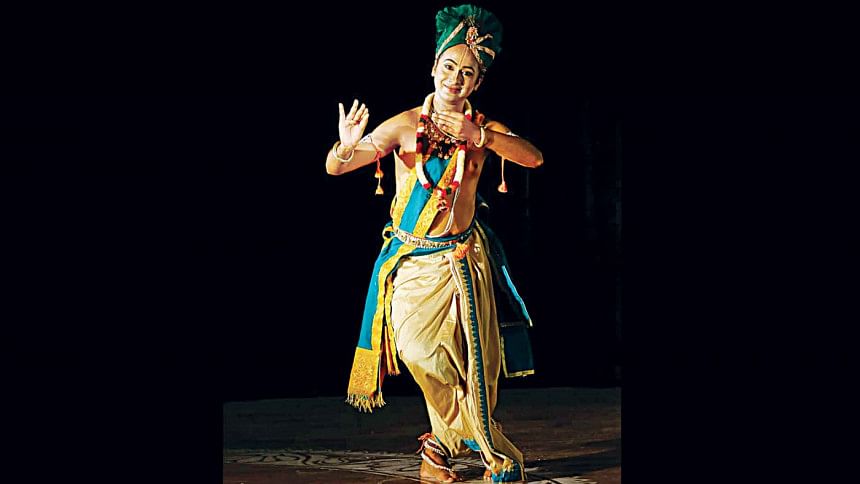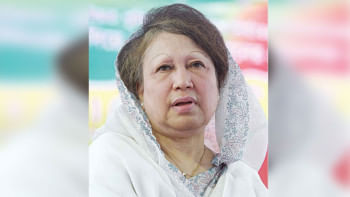Reshaping life through Manipuri Dance

Manipuri exponent Warda Rihab is one of the most prominent classical dancers globally. While working towards her dream of becoming a dancer, she came across Sony Chowdhury nearly twelve years ago, who dreamt of becoming a Bharatanatyam dancer, just like she once wanted to. In a candid chat with The Daily Star, Warda and her protégé Sony share their how they have grown together over the years.
Despite being a business graduate, Warda chose to travel all the way to Rabindra Bharati University, Kolkata, with a scholarship of just Rs 6000 when her friends were building their careers in the corporate sector. "During the five years that I spent there under the guidance of my guru ma Kalavati Devi and my teacher Bimbavati Devi, a passion towards dance was instilled in my heart," she shares. "Without any further delay, I decided to take a leap of faith towards dancing."
Unlike Warda, Sony hails from the suburbs of Bangladesh. "Under the influence of media, I developed a misconception of glamour being more important than dance for a performer on stage," says Sony, who first started formal dance training at Shanto-Mariam University of Creative Technology. "However, this perception was fully altered when I joined the institute Dhriti Nartanalaya, spearheaded by Warda. She made me realise how the story behind the routine is what matters,, more than gorgeous clothes or exquisite makeup."
Warda and Sony have worked together in numerous local and international projects. Sony left for Rabindra Bharati University to seek tutelage from the same gurus who once were guiding lights to Warda. After completing his master's, Sony decided to return to his roots and establish a stronger ground for Manipuri dancers in South Asia.
Bearing this in mind, the duo started choreographing and performing dance recitals, such as "Alor Pothojathi", "Shyama", "Mayar Khela" and "Hajar Bochorer Bangali", which emerged as some of the most prominent dance dramas in recent times. "We have performed in close to 8 countries together, including America, Bangkok, Turkey, and Australia, besides our homeland. Be it costume designing, choreography or script, Sony has always been around for me," says Warda.
Over the years, Warda and Sony learned a lot from each other. "I still look up to Sony's makeup skills as I am not as good at makeup as him, despite several attempts," laughs Warda.
Sony, who now assists Warda in running Dhriti Nartanalaya, has learned how Manipuri, even its simplest form, must radiate the essence of literature. He aims to revive the culture and tradition of the Indian subcontinent, presented in the form of dance. "I have been working with Warda for over a decade now and during all this time, I have known how each aspect, starting from the lyrics of the song to the hand gestures, choreography, formation, and costume, have to be in harmony, echoing the same message. Without her help and guidance, I would never have been able to be selected for my fully funded programme under Rabindra Bharati University," adds Sony.
Over the years, both Warda and Sony have faced their own struggles. " "As choreographers, we do not always get the budgeting we expect, but we still do the job from a point of love and respect for dancing. Nevertheless, contemporary dancers have been more inclined towards making dance as their source of income, rather than mastering the dance form they wish to pursue," mentions Warda. "Due to such trends, coming across well-trained dancers with good postures and techniques have become a rarity."
On the other hand, Sony has always been subjected to certain stereotypical misconceptions that a male dancer has to endure, especially in South Asian society. "Parents often feel unsafe to allow their children to train with male teachers and we can't blame them as today, the media is flooded with negative news," says Sony, who has received the Nrityakumodi Award, India. "I also think people's sense of punctuality and determination to achieve perfection in dance has lessened over time."
Warda and Sony have been working actively to keep their shows and Dhriti Nartanalaya running. Alongside online classes, their troupe performed recently at the Mujib Shotoborsho Programme. "We have grown together and now it's time for us to lead other birds towards the nest of Manipuri dancing," concludes Warda.

 For all latest news, follow The Daily Star's Google News channel.
For all latest news, follow The Daily Star's Google News channel. 



Comments